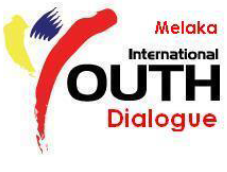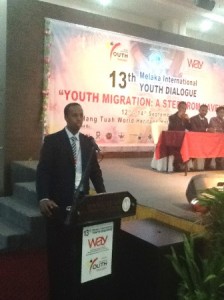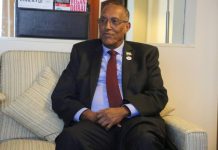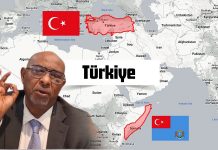 Melaka (SLpost)- Chairman of Somaliland’s National Youth Umbrella (SONYO) Mubarik Tani, has participated the 13th Melaka International Youth Dialogue summit which was held in Melaka, Malaysia between 12th and 14th of September 2013, which was discussed about the YOUTH Migration in Worldwide.
Melaka (SLpost)- Chairman of Somaliland’s National Youth Umbrella (SONYO) Mubarik Tani, has participated the 13th Melaka International Youth Dialogue summit which was held in Melaka, Malaysia between 12th and 14th of September 2013, which was discussed about the YOUTH Migration in Worldwide.
The summit which is annually held in Malaysia, was welcomed the Chairpersons of National Youth Consortium of 38 countries worldwide, it was discussed to raise an informative generation on the current situation of youth migration with anticipated behavior adaptation and consequently admission to decision making amongst youth.
It was also discussed to foster youth action towards implementation of ideas brought forward by the young people for the benefit of the societies.
The Declaration of the International Youth Dialogue states as follows:
13TH MELAKA INTERNATIONAL YOUTH DIALOGUE
“YOUTH MIGRATION: A STEP FROM HAVEN”
12TH TO 14TH SEPTEMBER 2013
HANG TUAH WORLD HERITAGE HOTEL, MELAKA, MALAYSIA
DECLARATION
1 PREAMBLE

1.1 We, the participants of the 13th Melaka International Youth Dialogue (MIYD) convened in Melaka from 12-14 September 2013 for an annual program organised by the World Assembly of Youth which brings together young people and youth leaders from around the world to discuss pertinent and topical youth issues.
1.2 By recognising the significance of youth migration and considering the statistics and research done, WAY made it an obligation this year that the 13th MIYD encompassed migration as an enduring concern faced by the youth with the theme: Youth Migration: A Step From Haven. This theme has been recognised to fulfill the predominant opinions of young people hence an interactive discussion on this topic has been of significance to form, educate and increase awareness on the adversities and prerogatives of youth migration at different levels of society that we represent.
1.3 Therefore, with the above mentioned theme, participants and all relevant stakeholders present such as the young people, youth leaders, public and private sector, academia, international, regional and national organisation representatives gathered to call for action and structure experience on the youth migration issues. This outcome document is expected to enhance youth contribution towards promoting a more humane approach towards youth migration.
1.4 After thorough deliberations through paper presentations, plenary sessions, workshops and field trips, we, the participants, have put together this document with the following recommendations that we strongly feel ought to be implemented by all the stakeholders to ensure that the rights of various categories of youth migrants, such as but not limited to political, economical, environmental and social migrants, are acknowledged and protected.
The guiding principles for this declaration were based on the following objectives:
i. To raise an informative generation on the current situation of youth migration with anticipated behavior adaptation and consequently admission to decision making amongst youth;
ii. To foster youth action towards implementation of ideas brought forward by the young people for the benefit of the societies;
iii. To address the challenges and determinants of migration faced by youth today;
iv. To promote equality of opportunities and facilities between young men and women;
v. To formulate the environmental, political, economic and cultural factors that are associated with migration;
vi. To ascertain the obligations of society to respect, protect and fulfill the right to freedom of movement for/among the young people;
vii. To classify the role and the contribution of the national youth councils and other stakeholders towards improving and sustaining resourceful migration factors as a human rights issue;
viii. To form and advance the national, regional and international policies governing youth migration for the present and future;
ix. To integrate networking, collaboration and cooperation between public and private sectors, civil societies, youth organisations and other stakeholders to address the issue of youth migration;
2 RECOMMENDATIONS
2.1 Public Sector
2.1.1 To formulate, review, implement and evaluate policies and programmes on youth migration in line with the Universal Declaration of Human Rights.
2.1.2 To ensure the implementation of coherent national, regional and international policies and guidelines with regards to youth migration.
2.1.3 To involve youth in the decision making processes, review, implementation and evaluation with regards to migration.
2.1.4 To create awareness and disseminate information on existing and newly formed policies and programmes on youth migration.
2.1.5 To provide resources to all relevant stakeholders on migration for effective implementation of policies and programmes on youth migration.
2.1.6 To establish accessible research centers that should provide up to date data (gender and age disaggregated), necessary and reliable information on youth migration.
2.1.7 To form policies that will provide an equal platform for both local and foreign youth with regards to employment, education, healthcare, security, housing, insurance etc.
2.2 Private sector
2.2.1 To collaborate with relevant stakeholders in order to provide and ensure decent jobs for young people.
2.2.2 To establish training centres that will provide vocational and professional skills for young people.
2.2.3 To provide resources for young migrants, for self-employment and others.
2.2.4 To support and adhere to basic employment regulations and rights of young migrant workers.
2.2.5 To comply with environmental laws in order to prevent environmentally induced migration.
2.2.6 To encourage companies to provide programmes for youth migrants as part of their corporate social responsibility (CSR) strategies.
2.3 National, Regional and International NGOs
2.3.1 To establish peer-to-peer and participatory awareness programmes aimed at addressing issues on youth migration.
2.3.2 To diversify the projects and carry out continuous programmes that will help spread awareness and address the need for youth to be actively involved in tackling migration issues.
2.3.3 To involve more youth organisations in community service and volunteering through projects related to youth migration.
2.3.4 To encourage collaboration among various organisations in order to improve their respective capacities with regards to youth migration.
2.3.5 To foster synergy and collaboration, and strengthen the efforts of both the public and private sectors for addressing youth migration issues.
2.3.6 To enhance the capacity of relevant stakeholders in order to fight stigma and discriminatory practices towards youth migrants.
2.3.7 To recognise and communicate best practices of implemented migration policies and programmes in order to encourage policy makers and other relevant stakeholders to tackle youth migration issues.
2.3.8 To encourage all the relevant stakeholders to utilise the traditional and new forms of media in disseminating current policies and programmes related to youth migration and development issues.
2.4 Media
2.4.1 To establish social network platforms where all youth can find relevant information and effectively communicate ideas on addressing migration challenges and opportunities.
2.4.2 To publish reliable and up-to-date information obtained from trusted and verifiable sources on migration issues.
2.4.3 To encourage investigative and critical journalism that addresses the leading factors of youth migration.
2.4.4 To produce, broadcast and publish informative programmes on migration focusing on legitimate procedures for young people.
2.4.5 To involve youth and other stakeholders in all forms of media programs related to migration issues.
2.5 Society
2.5.1 To foster positive public perception of every society and provide necessary support to the youth migrants.
2.5.2 To recognise that youth migrants have the say to make informed decisions regarding their rights.
2.5.3 To create a platform that promotes the socio-political, cultural and economic integration of youth immigrants.
2.5.4 To discourage and eradicate unhealthy practices including and not limited to discrimination and xenophobia towards young migrants.
3 GENERAL COMMENTS
3.1 To encourage all stakeholders to strengthen their partnership for the enhancement of youth migration and their rights.
3.2 To generate opportunities that would allow the youth to participate, create, develop and stand for rights of young migrants.
3.3 To promote local, national, regional and international development cooperation among stakeholders in origin, transit and destination countries or societies.
3.4 To urge collaboration among all the stakeholders in order to provide easy access to quality jobs, healthcare and education for young migrants.
3.5 To strengthen and promote meaningful youth participation at all levels of decision making on migration and implementation of programmes.
3.6 To ensure that migration and remittance does not replace long term development strategies or policies that are crucial towards youth development and self-actualisation.
3.7 To encourage youth to follow the appropriate legal channels of migration at all times.
3.8 To proactively engage youth-led activities to mitigate the challenges of youth migrants whilst enhancing their development potential.
4 CONCLUSION
We, the participants of the 13th Melaka International Youth Dialogue, realise and recognise the importance of fundamental human rights of young people, regardless of their migration status. We seek to generate youth dialogues and advocate for legislations, policies and programmes at all levels of society in order to ensure a “safe haven” for young migrants.
COUNTRIES REPRESENTED
- Albania
- Azerbaijan
- Bangladesh
- Botswana
- Brunei Darussalam
- China
- Czech Republic
- Egypt
- Eritrea
- Ethiopia
- Germany
- Ghana
- Hungary
- India
- Indonesia
- Iran
- Kenya
- Macedonia
- Mauritius
- Malaysia
- Namibia
- Nepal
- Nigeria
- Pakistan
- Philippines
- Saudi Arabia
- Somalia
- Somaliland
- South Africa
- Sri Lanka
- Sudan
- Syria
- Uganda
- United Arab Emirates
- United Kingdom
- United States of America
- Uzbekistan
- Vietnam
- Yemen
DOWNLOAD the Original Declaration
Kadar I. Kaariye
editor@somalilandpost.net























